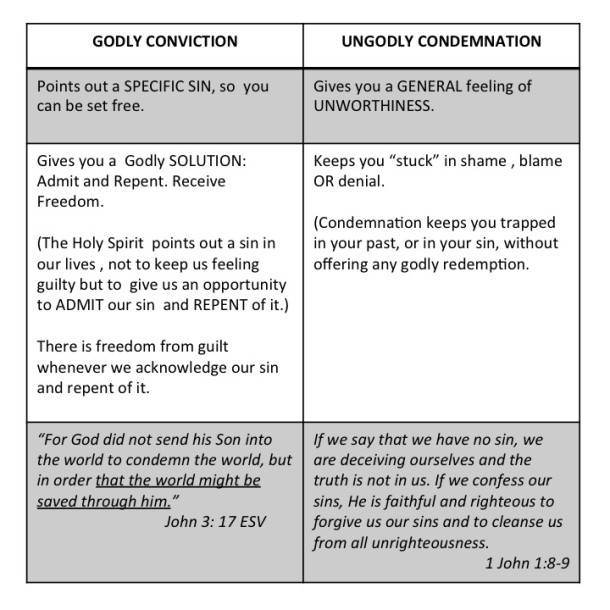To deal with guilt you have to understand the difference between condemnation and conviction.
There are people who feel guilty about never doing enough. And there are people, on the other extreme end, whose conscience are so hardened, they never feel guilty about the wrong they do. Instead they blame society, or a sickness or someone else for their own wrongdoing. How then can a Christian handle feelings of guilt?
1. Identify the source of guilt.
Is it God convicting you of sin? Or is it the devil condemning you ? What’s the difference? God convicts you of sin, to give you an opportunity to be set free. The devil accuses and condemns, so he
can keep you stuck in a cycle of guilt.
2. Apply God’s solution.
Don’t underestimate the power of the cross of Jesus Christ to set you free. God knows people are sinners and that we all needed Jesus to save us from a pattern of sin. Humility is key to forgiveness. God is always a giver of hope. Paul, who described himself as “the worst sinner”, found a new life as a follower of Christ and a clear conscience when he ran to God and repented.
1 Timothy 1:15 This is a trustworthy saying, and everyone should accept it: “Christ Jesus came into the world to save sinners”–and I am the worst of them all.
3. Let your guilt make you run towards God. Not run away from Him.
The devil’s ploy is to make you run away from God. Remember how Adam hid after he sinned. Jesus came to break the yoke of sin and the yoke of condemnation:
Matthew 11: 28-30 (NET) Come to me, all you who are weary and burdened, and I will give you rest. Take my yoke on you and learn from me, because I am gentle and humble in heart, and you will find rest for your souls. For my yoke is easy to bear, and my load is not hard to carry.
When feelings of condemnation linger, even after you’ve repented, refuse to entertain them.
Isaiah 43:25 (ESV) “I, I am he who blots out your transgressions for my own sake, and I will not remember your sins.”
- Watch the video together or invite someone to summarize the topic.
- What is your initial reaction to this video? Do you disagree with any of it? What jumped out at you?
- What stood out most in the video? What, if anything, did you have a hard time grasping or accepting? Explain.
- In your own words, explain the difference between condemnation and conviction. Share an example from your own life.
- How do people typically deal with feelings of guilt? What is the end result?
- Read 1 Timothy 1:15. How does Christ’s forgiveness of Paul, “the worst of all sinners”, help you in your situation?
- Write a personal action step based on this conversation.


